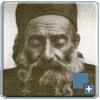A Short Tribute
Hacham Shalom Hadaya was born to Sbatiya and Rabbi Moshe Haim in 1864, in Aram Tzova (Aleppo), Syria. He married Sarah Lavi Lebaton and, after much suffering, the couple were left with five children.
In 1890, he visited the Land of Israel as the guest of Rishon LeZion Hacham Yaakov Shaul Elyashar. During his stay, he became ill and was left almost entirely blind. Following the advice of physicians, he travelled to Alexandria, Egypt for surgery and his sight was restored.
In 1899 he immigrated to the Land of Israel and settled in Jerusalem. Hacham Shalom Hadaya joined the Beth El Kabbalist yeshiva where he studied with Hacham Mas’oud Cohen, author of the book, Simchat Cohen. In 1927, following Hacham Mas’oud Cohen’s demise, Hacham Shalom Hadaya was appointed Rosh Yeshiva.
He was appointed dayan at the Sephardi Rabbinic Court of Jerusalem in 1904, and in 1930 became its president; he remained in this role for the remainder of his life.
Hacham Shalom Hadaya spent 40 years as a rabbinic judge. He feared no one and would investigate and research every case to rule as precisely as possible. He was known for his great modesty and charity, and would provide financial support to poor people and humble Torah scholars for their Sabbath needs.
Hacham Shalom Hadaya authored several books: Seh LeBeit Avot – a commentary on Ethics of Our Fathers; Shalom La’Am – sermons on the attributes of charity and compassion; Dover Shalom – Responsa on the four Torim; HaHaim VeHaShalom – a collection of sermons.
Hacham Shalom Hadaya also edited and published rabbinic manuscripts that had been left with their authors' heirs at his own expense, including: Degel Mahane Ephraim by Hacham Ephraim Laniado, and Kiseh Shlomo by Hacham Shlomo Laniado.
Hacham Shalom Hadaya passed away on 13 Kislev, 5705 (1945).
